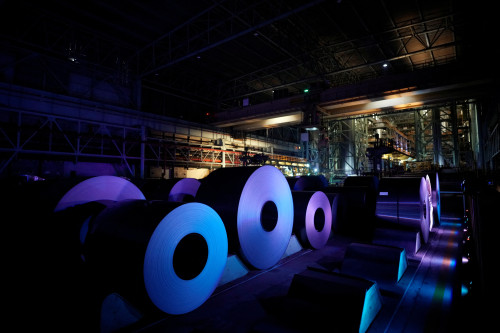By Amy Lv and Hongmei Li
SINGAPORE (Reuters) -China says it wants to cut crude steel output this year but traders and steelmakers are betting Beijing won’t follow through as industry profitability improves and trade tensions weigh on the economy.
The world’s largest steel producer in March unveiled plans to cut output and restructure its giant steel sector to address overcapacity which has long plagued the industry and is spilling over into export markets and angering trade partners.
But at the flagship Singapore International Ferrous Week conference, conversations with fifteen traders, steelmakers, analysts and hedge funds all had the same message: the cuts are unlikely to be enforced.
Profitability is improving across the industry driven by unexpectedly strong demand, undercutting some of the logic of reining in output in the first place, they said. In the year to April industry profits hit 16.9 billion yuan ($2.35 billion), versus a loss of 22.2 billion yuan in the same period last year.
Participants bet the turnaround will make Beijing less likely to crack down, especially as the trade war with the United States makes policymakers sensitive about maintaining economic growth.
There’s even less incentive for the local governments where many of these steel mills are an important contributor to the growth targets officials are assessed against.
“When mills could make some money after grappling with survival in the past two years, no one has the motivation to slash output,” said a manager from a medium-scale Chinese steelmaker on condition of anonymity.
Chinese crude steel output rose 0.4% between January and April this year.
In China, the absence of public orders from Beijing since the March announcement was a sign for many at the conference that the output cuts will be limited or only halfheartedly enforced.
Chinese consultancy Fubao said in late April that while provincial targets for output cuts had been finalised, there were doubts about whether steel mills would actually follow through.
“Some provincial governments will rely on steel to help with GDP,” said Mengtian Jiang, chief ferrous metals analyst of Harizon Insights.
“Steel mills are making money especially with domestic coking price having almost halved, so I do not see that China’s steel output will be down much.”
Steel exports may fall 3%-4% this year, but that will not impact China’s steel output much, she added.
($1 = 7.1976 Chinese yuan renminbi)
(Reporting by Amy Lv and Hongmei Li in Singapore; Editing by Lewis Jackson and Shri Navaratnam)





